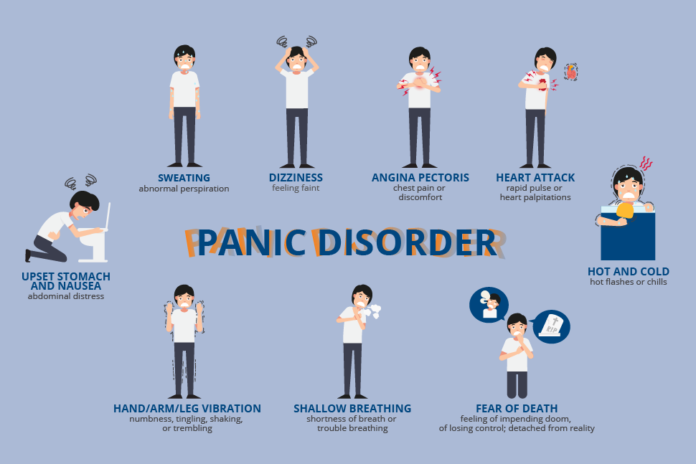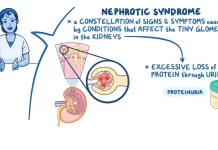Panic disorder is a type of anxiety disorder characterized by recurrent, unexpected panic attacks. These are sudden periods of intense fear or discomfort that peak within minutes. People with panic disorder often live in fear of having a panic attack and may avoid places or situations where they previously experienced an attack.
Symptoms
The primary symptom is the panic attack itself, which can include:
- Rapid heart rate
- Sweating
- Trembling or shaking
- Shortness of breath or feeling of choking
- Chest pain or discomfort
- Nausea or abdominal distress
- Dizziness, lightheadedness, or feeling faint
- Chills or hot flashes
- Numbness or tingling sensations
- Feelings of unreality or detachment from oneself
- Fear of losing control or “going crazy”
- Fear of dying
Causes
The exact cause is not fully understood, but several factors may contribute:
- Genetics: A family history of panic disorder or other anxiety disorders may increase the risk.
- Brain structure: Changes in certain parts of the brain and the way they function can play a role.
- Stress: Significant stress or traumatic events can trigger the first panic attack.
- Biological factors: An imbalance of neurotransmitters, such as serotonin and norepinephrine, may be involved.
Treatment
Panic disorder is treatable, and several options are available:
- Cognitive Behavioral Therapy (CBT): This is the most effective form of psychotherapy for panic disorder. It focuses on identifying and changing negative thought patterns and behaviors.
- Medications:
- Selective Serotonin Reuptake Inhibitors (SSRIs): Commonly prescribed antidepressants, such as fluoxetine (Prozac) and sertraline (Zoloft).
- Serotonin-Norepinephrine Reuptake Inhibitors (SNRIs): Medications like venlafaxine (Effexor).
- Benzodiazepines: Fast-acting anti-anxiety medications like alprazolam (Xanax) and clonazepam (Klonopin). These are usually prescribed for short-term use due to the risk of dependence.
- Lifestyle Changes:
- Regular physical activity
- Avoiding caffeine, alcohol, and recreational drugs
- Practicing relaxation techniques, such as deep breathing, yoga, or meditation
Prevention
While it may not be possible to prevent panic disorder, the following strategies can help reduce the frequency and severity of panic attacks:
- Stress Management: Techniques like mindfulness, meditation, and regular exercise can help manage stress.
- Avoid Stimulants: Limit or avoid caffeine and nicotine, as these can trigger panic attacks.
- Sleep: Ensure you get adequate and regular sleep.
- Healthy Lifestyle: A balanced diet and regular physical activity can improve overall mental health.
- Seek Early Treatment: Early intervention can help prevent panic disorder from worsening.
- Support Network: Building a strong support network with family and friends can provide emotional support and reduce anxiety.
































